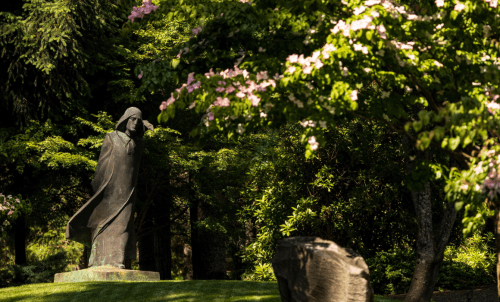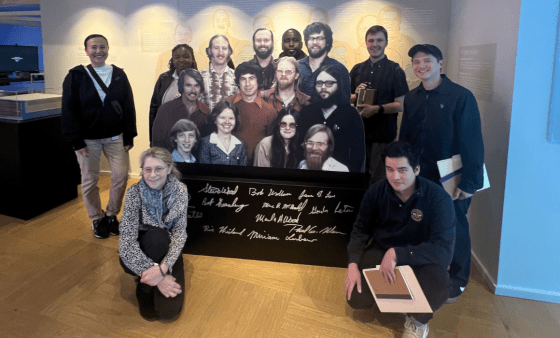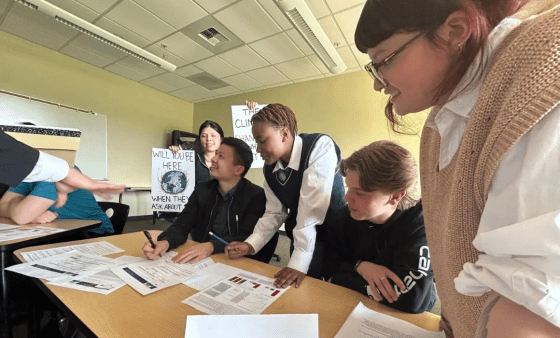Reflections on St. Benedict

The Saint Martin’s community celebrates St. Benedict's Day on March 21. As a Benedictine institution, we honor this day to commemorate the values of hospitality, community and lifelong learning that St. Benedict instilled. His teachings inspire us to foster a welcoming environment where all can thrive.
- Reflections from students
- COR 310/RLS 370: Benedictine Spirituality
- Dr. Patrick Cooper
Students from assistant professor, Patrick Cooper’s COR 310/RLS 370 Benedictine Spirituality class were asked to articulate what they regard to be unique, relevant and enduring about St. Benedict and Benedictine values.
Courage
The value of service in Benedictine tradition is a profound pillar in how the practice distinguishes itself. Service is known as the devotion to the wellbeing of others that brings us closer to our origins and closer to our community, we all have a call to serve in some way, secular or not. The very reason we attend higher education is laced with the call to serve the world, by finding our purpose in this three-dimensional space. The ability to serve requires love for one another despite differences that make us unique, and love for yourself to be open to receive such goodness as well. Another aspect that is required of service, maybe overlooked, is courage.
Courage can be believed to be the integrity present in acts of service, even if fear coexists with the display of strength. Why is courage an important aspect to properly uphold the Benedictine value of service? I believe that courage goes beyond doing what can be unwanted, but it calls to go deep inside the self, which is uncomfortable. The call to reflect takes courage, staying within the realms of comfortability is much easier than challenging our original beliefs and opinions, that can hinder serving the community. Being seen through service is quite vulnerable, again using courage to follow through. Being seen as a leader, or even as a helpful stranger, connects us individually, bringing a sense of accomplishment and collective happiness. The courage to be uncomfortable makes us more comfortable in the end.
Emily Zhuravel '27
Psychology major
Service
Restraining one's own will and doing the will of others falls under the tenant of service, a characteristic that highlights ultimate obedience in St. Benedictine spirituality. Why is this important in modern life? We subconsciously participate in obedience to others. Examples of that are social norms such as the power of titles, doctors garnering automatic trust and influence, being an authority figure, someone older, or your source of guidance, such as a parent or a teacher. Social norms are found not only in the tangible realm but also in the digital realm. Technology has become a prominent way in which we communicate. New platforms transform traditionalism, and this is discovered in the way we express obedience today. Humanitarian causes that may not be publicly discussed with transparency or given the room to blossom into authentic research are left to wisdom seekers. This is the same approach to wisdom Benedict went into the caves hoping to attain. Find the depth of what you influence. Titles do not matter. Expressing humility is essential in creating an effective environment of influence in your community. This humble undertaking identifies Benedict’s leadership.
Like you and me, we are constantly curious to evolve in our study. Tasking with services categorized today as “burdens” is a limiting prospect. Family and friends need us, and people in our community need us. We all work together to lift one another from the ashes and bring life and new beginnings. If we release this sooner, we can serve our community and aid in the evolution and well-being of that foundation. In conclusion, wisdom comes from experience, and being the one to do your own will and the will of others who may not have the platform, voice, or abilities is a righteous path. It should not be viewed as burdensome; the sooner we realize the wisdom and obedience in our community and our hearts we will strive to serve others without limiting our outreach.
Yasmine Barakat '25
Political Science major
Freedom and Listening
Freedom through obedience. At first glance, this seems like a contradiction. Is obedience not the very opposite of freedom? We assume that if we are genuinely acting freely, we must be listening to none but our own hearts. But the question we rarely seem to ask is who or what our hearts are listening to.
The Rule of Saint Benedict opens with the word “listen.” This simple command represents what is, to modern ears, a striking call to obedience. Such a call might appear at odds with our modern notions of freedom since to obey is to accept limitations on our autonomy or ability to choose for ourselves. But do we truly make our decisions independently? Why do we wear the clothes we wear? Buy the products we buy? Vote for whom we vote? Are we really making such decisions by the voice of our own hearts alone, free from the influence of others or a particular set of social pressures?
Benedict recognized that our hearts are always listening to something and thus that we are always obeying some voice whether we realize it or not. Therefore, for Benedict, this call is not one of blind obedience but challenges us to ask whom it is that we are following. In other words, it calls us to ask whose voice we are listening to. We may believe we are listening to none but our own, but until we stop and listen attentively with the ears of our hearts, we will go on accepting those limits that others place upon us. Thus Benedict presents listening obedience as the first step in human freedom; for to be truly free, we must first be aware of what it is we are choosing to obey.
Alexander Wickett '26
Theology & Religious Studies major
Loving Obedience
Saint Benedict’s Rule is as relevant today as it was when it was written over 1500 years ago. At St. Martin’s University, we share in the fruits borne from careful consideration and application of his Rule by our very own resident Benedictine monks. The spirit that is imbued in the text of the Rule has motivated both religious and laity alike to build communities founded on the pursuit of God and buttressed by the resulting love of all things holy. But you do not have to be a monk, or even a professed Christian, to appreciate the wisdom found in St. Benedict’s Rule.
As students of St. Martin’s University, we can all easily familiarize ourselves with the basic tenets of the Rule by simply reading one of the seventy-three rules and attempting to apply them to our lives however we can. One does not even have to read past the prologue to glean the essential ethos of the Rule: loving obedience. St. Benedict immediately asks us to “Attend to the message you hear and make sure that it pierces your heart . . . the directions that come from your loving Father.” (Prologue, RB) Such a gentle imperative encourages even the most skeptical and rebellious amongst us to momentarily lower our cynical defenses, since the author of the Rule is not asking for blind obedience or strict adherence, but instead is asking us all to simply listen to the message we hear like as if it was coming from someone who loves us and wants us to be the best we can possibly be.
For religious Christians, this is a call to holiness; for those of us who are not religious, this can be a call to better understand yourself so that you may better understand others around you. But to be able to hear such a gentle call, we must all first simply learn how to listen with the ear of our hearts.
Hector Santiago '25
Theology & Religious Studies major
Theology and Religious Studies
The Theology and Religious Studies Department is rooted at the heart of Saint Martin’s identity as a Catholic and Benedictine University and thus proudly and hospitably serves our diverse community of students. Our courses invite students to engage in questions posed since ancient times by various religions, and of Catholic Christianity in particular, such as the ultimate meaning of human existence in relation to God and the establishment of an ethical society. We encourage students to appreciate the influence of religion throughout human history and in current global affairs as foundational for further, deeper reflection on religious belief as transformative of the human person in their theological, spiritual, artistic, social, ethical, narrative, and scriptural dimensions.
- Campus
-
- Main (Lacey)
- Type of Instruction
-
- In Person
- Degree
-
- Bachelor of Arts



